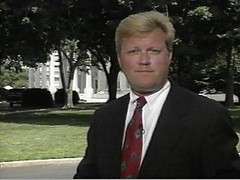When I left teevee news, you could have heard a pin drop in newsrooms across town. Some of my coworkers thought I’d be the last guy to leave. Big-J Journalism, through and through.
As I started my fledgling steps in the world of public relations, I was quite fortunate to do it in a market where I had worked for seven-and-a-half years. I knew the reporters and the gatekeepers, and they knew me. Some questioned why I would go over to “the dark side.” For the most part, I knew they were kidding.
Apparently, some aren’t kidding when they make comments like that.
 Again — having been shielded — I never stopped to think about the source of this antipathy. (At least not in a deep, philosophical way.)
Again — having been shielded — I never stopped to think about the source of this antipathy. (At least not in a deep, philosophical way.)
Others have written about this in the past, so I’m not going to rehash with a war story. (And a tip of the hat to Scott at Media Orchard.) I instead offer an allegory:
A great wall divides two camps. On one side, you’ll find a scattering of wells, mines, and other resources. On the other side, you’ll find all of the roads that go to market, and the keys to the fence.
The first tribe knows it must befriend the second tribe if they want to get the most exposure in the market. The second tribe knows they can forage for themselves on the other side, but they can find what they want more quickly if the first tribe guides them in.
It’s a somewhat symbiotic relationship that still appears to favor the tribe with the keys. (If you are urging me to use the word “parasitic” instead, you might be too close to the situation!) I say “appear” because there is a final dynamic at play: competition.
The “keymasters” ought to be living on easy street, but there are too many of them to act as a bloc. As much as they want to exploit the guide-tribe, they know they’ll lose in quantity and quality if they go it alone. If they are the last to market with the wool/water/gold/firewood, they lose.
That’s how competition balances the relationship — but that same competition sours it when misplaced. Journalists are predatory in nature. They seek. They stalk. They hunt. And they do so in an environment where they are competing with several other news-related outlets. And they also compete in-house with the very people that ought to be helping them. When you see nothing but competition in your own editorial meeting, and nothing but competition coming from the other shops in town, and nothing but competition for the ever-fickle consumer… it’s easy to see how that competitive drive ends up aimed at the PR practitioner.
The attitude of many journalists is that they are out for a “higher calling.” That the PR people have “sold out.” The PR people have something to hide — and (here’s the competition) the game to reveal “the truth” is on. “The truth,” of course, fitting their template.
 The real irony at play is that the “Big-J” journalists like to adhere to the old line about “giving hope to the helpless and voice to the voiceless.” In other words, providing a platform for those who would not otherwise be heard. But if that “voiceless” person happens to own a business or be somewhat successful — well, all bets are off. There’s no need to “represent” these people fairly, or help them communicate their point of view.
The real irony at play is that the “Big-J” journalists like to adhere to the old line about “giving hope to the helpless and voice to the voiceless.” In other words, providing a platform for those who would not otherwise be heard. But if that “voiceless” person happens to own a business or be somewhat successful — well, all bets are off. There’s no need to “represent” these people fairly, or help them communicate their point of view.
Tribe #2 had better get its collective (cooperative) act together… the tools are changing, and those of us on the PR side are getting less-and-less reliant on their precious keys and gates…
 Sometimes all it takes is one wrong click of the mouse. Eric Govan got bounced out of the Golden State Warriors PR department for sending an inappropriate e-mail to a rather large list. Since this happened in the same market as last year’s 49er training video debacle, the effect is somewhat magnified.
Sometimes all it takes is one wrong click of the mouse. Eric Govan got bounced out of the Golden State Warriors PR department for sending an inappropriate e-mail to a rather large list. Since this happened in the same market as last year’s 49er training video debacle, the effect is somewhat magnified.Reitman said the mysterious disappearance during the Sundance Film Festival has been great publicity for the movie. He also understands why some people prefer to think Tom Cruise ordered him to cut the scene. Reitman said the problem with the term “projection error is that it’s the truth but it sounds like a lie.”


 At least I have hacked my sidebar so I can keep some things hidden.
At least I have hacked my sidebar so I can keep some things hidden. Again — having been shielded — I never stopped to think about the source of this antipathy. (At least not in a deep, philosophical way.)
Again — having been shielded — I never stopped to think about the source of this antipathy. (At least not in a deep, philosophical way.) The real irony at play is that the “Big-J” journalists like to adhere to the old line about “giving hope to the helpless and voice to the voiceless.” In other words, providing a platform for those who would not otherwise be heard. But if that “voiceless” person happens to own a business or be somewhat successful — well, all bets are off. There’s no need to “represent” these people fairly, or help them communicate their point of view.
The real irony at play is that the “Big-J” journalists like to adhere to the old line about “giving hope to the helpless and voice to the voiceless.” In other words, providing a platform for those who would not otherwise be heard. But if that “voiceless” person happens to own a business or be somewhat successful — well, all bets are off. There’s no need to “represent” these people fairly, or help them communicate their point of view.
 I still run across “old-schoolers” who beat the same mantra they memorized out of the old PR texts. That includes the old “sneak the bad news out on a Friday” canard.
I still run across “old-schoolers” who beat the same mantra they memorized out of the old PR texts. That includes the old “sneak the bad news out on a Friday” canard.

 “The orange that they’re wearing is not because they’re concerned that the vice president may be there,” joked White House press secretary Scott McClellan, following the lead of late-night television comedians. “That’s why I’m wearing it.”
“The orange that they’re wearing is not because they’re concerned that the vice president may be there,” joked White House press secretary Scott McClellan, following the lead of late-night television comedians. “That’s why I’m wearing it.”

 An extended tip of the ten-gallon to Tex over at
An extended tip of the ten-gallon to Tex over at  Governor Frank Murkowski (R-AK) wants to change America’s image of Alaska.
Governor Frank Murkowski (R-AK) wants to change America’s image of Alaska. Gov. Frank Murkowski says it is time for an image makeover. He wants the state to hire a public relations firm to change the perception of Alaska and its people as greedy for federal dollars and all too willing to plunder the environment for profit.
Gov. Frank Murkowski says it is time for an image makeover. He wants the state to hire a public relations firm to change the perception of Alaska and its people as greedy for federal dollars and all too willing to plunder the environment for profit.






























